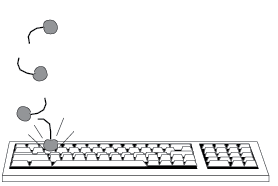
Imagine the console operator, while working under a cherry tree, falls asleep as a swift wind kicks up. Cherries fall onto the console and hit exactly the same cases the operator would have typed to instantiate the Gigantor computations.
Now the computations are controlled only by natural laws, without human direction.
Yet falling cherries should not make the difference between an entity having and not having mental states.
Functionalists must claim that it does make a difference.
Therefore, functionalism (even with the natural Law requirement) is false.
Selmer Bringsjord (1992).
The Bringsjord argumentBringsjord writes:
"Suppose that Jones is out there overseeing the Lone Star production, punching away madly on his keyboard, and the poor Norwegians are scurrying about like automata, their brains under the electrical control of Jones' keyboard. Jones, however, is working in the cool shade under an enormous cherry tree, and he s growing tired and sleepy. What's more, a stiff breeze has kicked up. Jones, his lids growing too heavy, falls asleep right at his seat and slumps to the side. But the breeze picks up to the point where cherries begin to fall off overhead branches. And, as luck would have it, the falling cherries drop onto Jones' keyboard; moreover they fall and hit keys in just the way Jones' had been hitting them in order to drive the Lone Star brain."
Then Bringsjord concludes:
"It should be clear where I'm going... No autonomous agents are at work. The entire production is now under the control of physical laws--laws which stir the winds, and carry electrical impulses from Jones' console to our poor Norwegians. But is seems completely obvious that Jones' slumping over, and falling cherries serendipitously picking up where he left off, cannot be precisely the things that make a difference, and suddenly and unaccountably combine to give rise to Gigantor, a massive being who bears mental states like you and me" (S. Bringsjord, 1992, pp. 222-223).
ReferencesBringsjord, Selmer. 1992.
What Robots Can and Can't Be. Boston: Kluwer.